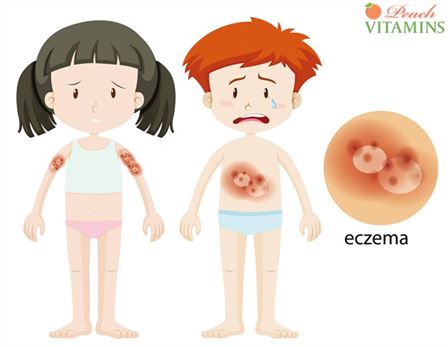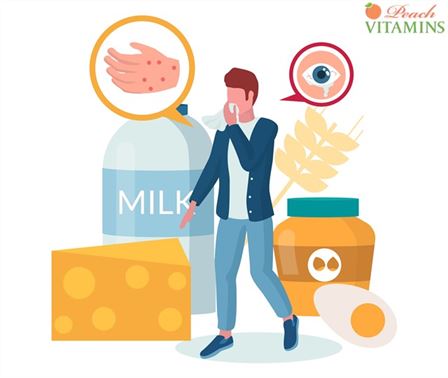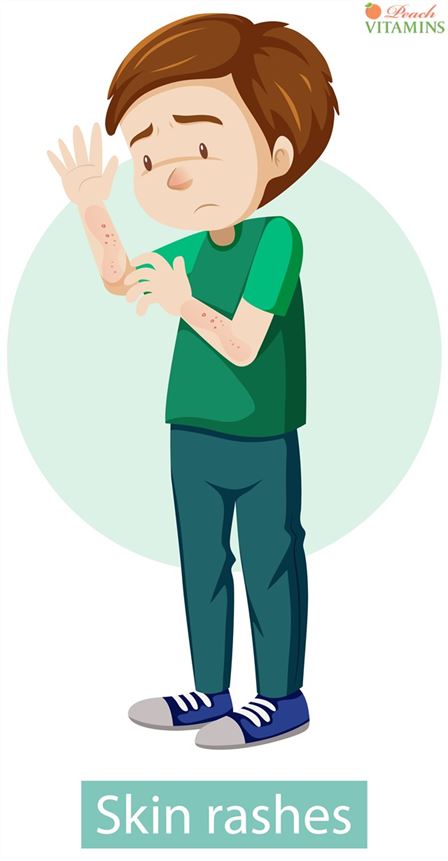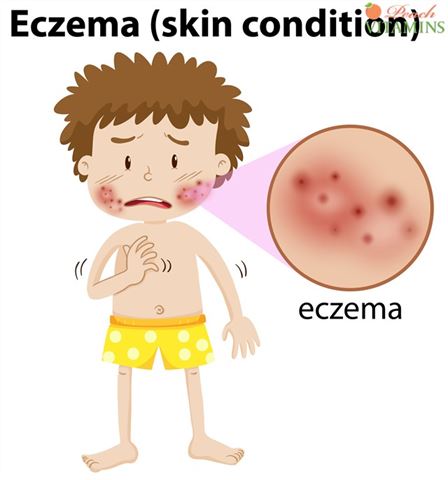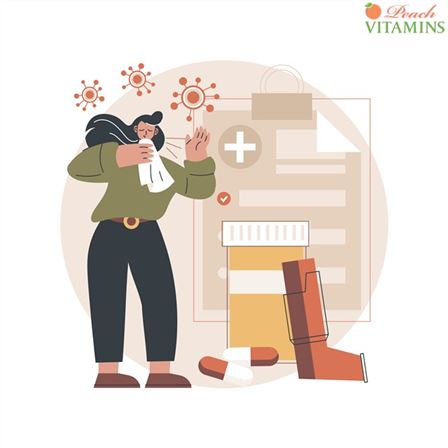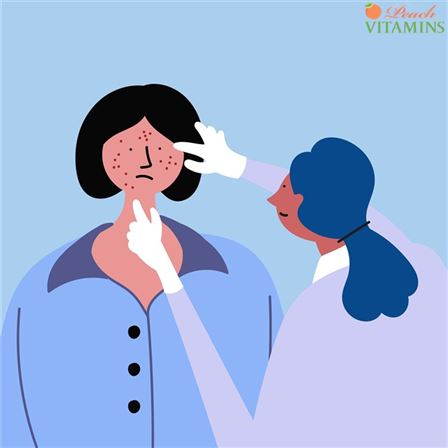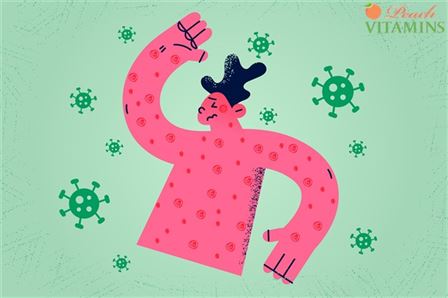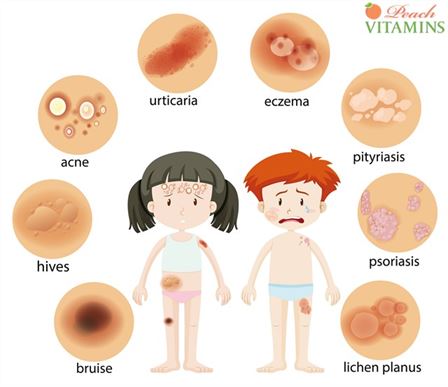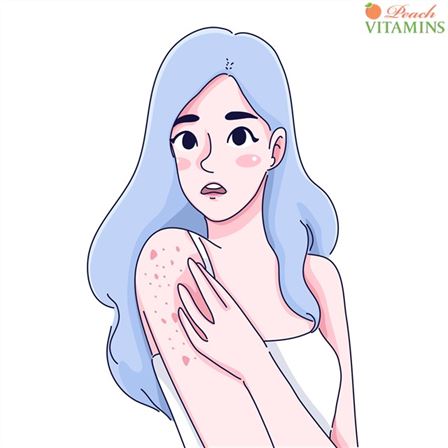Are you looking for a permanent cure for eczema in Ayurveda? If yes, then you have come to the right place. I am going to share some effective home remedies for skin problems using herbs and spices. These remedies will provide relief from eczema and other inflammatory skin conditions.
Eczema or atopic dermatitis is a chronic inflammatory condition of the skin caused by various external factors such as allergens, dryness, stress, etc. The major symptoms include itching, redness, scaling, burning sensation, and oozing.
Eczema is usually treated with topical steroids, antihistamines, moisturizers, and emollients. However, these treatments are not always effective. Hence, there is a growing interest in using herbal remedies for treating eczema. Herbs play a vital role in maintaining health and preventing diseases. They also offer a safe, cost effective, and convenient option for treatment.
Internal Factors That Can Cause Eczema
Eczema is a skin condition that causes redness, itching, and inflammation. The cause of eczema is unknown, but some internal factors may be involved.
One common cause of eczema involves food allergies. Food allergies can trigger eczema because foods contain proteins that irritate the skin.
Another likely cause of eczema includes stress. Stress can cause the body to produce chemicals called histamine, which can lead to eczema.
Other internal factors that can cause eczema include hormones, fungal infections, and genetics.
Eczema Treatment Based On Ayurvedic Principles
The Ayurvedic approach is a traditional Indian system of medicine that uses herbs, minerals, and foods to treat disease. The ancient Vedic texts describe eczema as a skin condition characterized by excessive dry skin, scaly skin, intense itching, redness, and inflammation.
Eczema Ayurvedic treatment based on Ayurvedic principles includes diet, lifestyle, herbal Ayurvedic remedies, and massage therapy.
Dietary recommendations include avoiding spicy food, alcohol, caffeine, refined sugars, processed meats, dairy, and fried foods.
Lifestyle suggestions include regular exercise, adequate sleep, stress management, and meditation.
Herbal treatment for eczema includes applying herbal oils to affected areas, taking herbal supplements, and drinking herbal teas.
Massage therapy involves gentle rubbing of the affected area with warm oil.
Eczema affects about 10% to 20% of infants and about 3% of adults and children in the U.S.
Source: (webmd.com)
Panchakarma Therapy
Panchakarma therapy is a traditional Indian system of medicine that uses five therapies to cure diseases such as eczema. The five therapies include Vamana (Vasodilator), Virechana (Bile Cleansing), Shirodhara (Head Massage), Nauli (Abdominal Exercise) and Pizhichil (Fomentation).
These therapies help reduce inflammation and relieve pain associated with eczema. They’re especially helpful when combined with diet and lifestyle modifications.
If you’ve been diagnosed with chronic eczema, you may be interested in learning more about this treatment of eczema option.
Ayurvedic Herbs Can Be Use To Treat Eczema
One herb used to treat eczema is Ashwagandha. Ashwagandha is a root that grows in India and Southeast Asia.
Ashwagandha contains chemicals called triterpenoids, which help reduce inflammation and improve blood flow. This helps to relieve symptoms of eczema.
Is Tulsi Good for Eczema?
Tulsi (Ocimum sanctum) is a sacred herb used in Ayurvedic medicine for thousands of years. It was considered holy because it was believed to cure many diseases, including eczema. Today, Tulsi is still used to treat skin conditions, such as psoriasis, acne, and eczema.
Ayurvedic practitioners believe Tulsi helps balance the body’s doshas (vata, pitta, and kapha), which are the three basic elements of health. They believe that when these doshas become imbalanced, disease occurs.
According to Ayurvedic theory, eczema is caused by excess vata dosha. Therefore, Tulsi should help reduce the symptoms of eczema.
There are treatments, but no treatment can claim to eliminate the symptoms of dermatitis 100% of the time.
Source: (my.clevelandclinic.org)
Can Turmeric Help Eczema?
Turmeric is a spice native to India that has been used for thousands of years to treat many ailments.
Eczema is a skin condition that causes redness, itching, and inflammation. Many people use turmeric to help reduce symptoms and speed healing.
Turmeric contains curcumin, a compound that may be helpful for eczema. Curcumin inhibits the production of inflammatory chemicals called cytokines, which cause swelling and pain.
Curcumin also helps block the action of enzymes that break down collagen, a protein that supports healthy skin. This makes it possible for damaged skin cells to repair themselves.
There are several studies showing that turmeric is effective at treating eczema. However, there isn’t enough evidence yet to prove that turmeric cures eczema permanently.
However, some people report that turmeric reduces the severity of their eczema, and it does not appear to harm the skin.
Can Neem Leaves Cure Eczema?
Neem leaves are used in Ayurvedic medicine to treat eczema. They’re effective against skin infections, rashes, and inflammation.
Neem leaves contain anti-inflammatory compounds called azadirachtin, which help reduce swelling and itching. The leaves are also rich in antioxidants, vitamins, minerals, and amino acids.
If you’re looking for natural ways to treat eczema, try applying neem leaves directly to affected areas. You can buy them at health food stores or online.
You can also use neem oil to treat eczema symptoms. To prepare this remedy, mix equal parts neem oil and coconut oil. Apply the mixture to affected areas twice per day.
Dietary Changes
Eczema is often triggered by food allergies, so dietary changes are important. The most common foods causing eczema flare-ups include dairy, wheat, corn, soy, eggs, nuts, fish, shellfish, tomatoes, citrus fruits, strawberries, peppers, chocolate, coffee, tea, alcohol, and caffeine.
If you’re having trouble finding out whether a particular food triggers forms of eczema, try eliminating it from your diet for two weeks. Then, if your skin clears up, you’ve found the culprit.
If you’re not allergic to any of these foods, you may still be sensitive to them. Try cutting back on consumption of those foods until your skin improves.
If you’re trying to lose weight, avoid eating too many carbohydrates. Carbohydrates cause blood glucose levels to spike, which leads to insulin production. Insulin causes fat storage. So if you’re trying to lose some pounds, cut down on carbs.
Also, eat plenty of protein. Protein helps build muscle mass, which burns calories. And when you exercise, you burn more calories than you consume. So if you’re looking to lose weight, eat plenty of protein after workouts.
Finally, drink plenty of water. Water flushes toxins from your body, including excess salt. This makes you feel fuller faster, which means you won’t need to snack between meals.
Foods to Avoid
Avoiding foods that cause inflammation is important because eczema is often triggered by food allergies. The most common culprits include dairy, wheat, eggs, citrus fruits, nuts, soybeans, corn, tomatoes, potatoes, chocolate, caffeine, alcohol, and MSG.
If you’re allergic to any of these foods, avoid them completely. But if you just need to limit your intake, try cutting back gradually.
Start by eliminating one food at a time until you find out which ones trigger your symptoms. Then cut back on those foods.
Once you’ve identified the problem foods, you can eliminate them permanently by following this simple diet plan.
1. Eat only organic produce. Organic foods are free of pesticides, herbicides, fungicides, and genetically modified organisms (GMOs). They’re also free of hormones, antibiotics, and artificial ingredients.
2. Drink filtered water. Filtering removes chemicals and heavy metals from tap water.
3. Eliminate processed foods. Processed foods contain preservatives, additives, and artificial flavors. These substances may be harmful to your health.
4. Cut down on red meat. Red meat contains saturated fat, cholesterol, and iron. It’s also high in calories.
5. Reduce your consumption of refined grains. Refined grains are highly processed and stripped of their nutrients. They’re also high in carbohydrates and sodium.
6. Increase your intake of healthy fats. Healthy fats provide essential fatty acids that help maintain skin health.
7. Limit your intake of sugary drinks. Sugary beverages contribute to weight gain, diabetes, heart disease, and tooth decay.
8. Include plenty of fresh vegetables and fruit in your diet. Vegetables and fruit are packed with vitamins, minerals, antioxidants, fiber, and phytonutrients.
Using Essential Oils
Essential oils are powerful natural remedies that help heal skin conditions, including eczema. They’re used in many ways, including topically, internally, and aromatically.
Topical essential oils are applied directly to the affected area, either alone or mixed with carrier oil. Internal essential oils are taken orally, either alone or mixed in water or juice. Aromatic essential oils are inhaled through the nose.
There are hundreds of essential oils available, each with its own unique properties. Some are effective at treating specific skin conditions, while others work well for multiple conditions.
When selecting essential oils for use in your home, consider the following factors:
• What condition does the oil treat?
• Is the oil safe for internal use?
• Does the oil smell pleasant?
• Are there any side effects?
• Can the oil be purchased online?
• Do you prefer organic or non-organic oils?
• Will the oil blend with your existing scents?
• Is the price reasonable?
How to Use Essential Oils Safely and Effectively
When applied topically, these essential oils can relieve pain, reduce inflammation, and prevent infection. But when taken internally, they can cause side effects. So it’s important to use them correctly.
To avoid any unwanted side effects, here are some tips to remember when using essential oils:
• Never ingest over 1 drop per day.
• Do not apply essential oils directly onto broken skin.
• Keep essential oils away from eyes and mouth.
• Avoid contact with mucous membranes.
• Store essential oils at room temperature and out of direct sunlight.
• Shake well before each use.
• Dilute essential oils in carrier oils if desired.
• Use only pure essential oils.
People Who Spend Time In Nature Develop Strong Immune Systems
There is no doubt that spending time in nature helps develop strong immune systems.
When we spend time outside, our bodies release endorphins, serotonin, dopamine, and oxytocin. These chemicals help us feel happy, relaxed, and calm. They also boost our immune system.
Studies show that children who spend time outdoors have stronger immune systems than those who don’t. And adults who spend time in nature have lower rates of allergies and asthma.
Research shows that spending time in nature boosts immunity. So when you’re feeling run down, take a walk in the park or go hiking. Your body will thank you!
Can Ayurveda Cure Severe Eczema Completely?
Ayurvedic medicine uses a holistic approach and offers natural treatments for eczema. The ancient Indian system of medicine uses herbs, oils, and diet to treat this condition.
Ayurveda is based on the concept of balance. This means that when there is imbalance in the body, the mind, emotions, and spirit, the body becomes unbalanced.
When the body is out of balance, the mind, emotions and spirit become unbalanced. The result is disease.
Ayurvedics believe that the root cause of eczema is not only physical, but also mental and emotional. Therefore, they use herbal remedies to help restore the body’s equilibrium.
Final Thoughts
A permanent cure for eczema in Ayurveda requires proper diagnosis and holistic treatment. If your healthcare provider has given up on you, then try alternative methods like homeopathy or naturopathy.
If you want to get rid of eczema completely, then take care of your body. Eat healthy food, exercise regularly, sleep enough, and stay stress free.
Also, scheduling a fifteen-minute consultation with Ayurvedic practitioner Cosmic Mike will help you take control of your health. He can provide you with the tools necessary to heal yourself naturally.

